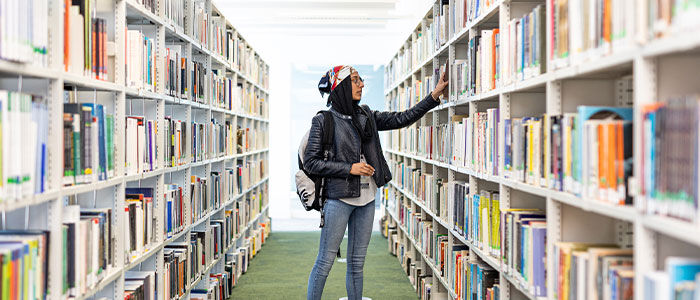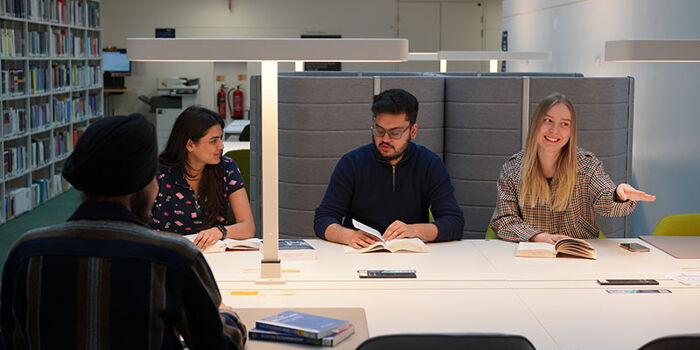Library & Learning Resources strategy

Contents
- Background
- Strategic Priority 1: Transforming to a digital future
- Strategic Priority 2: Transforming to openness
- Strategic Priority 3: Transforming our community
- Enablers of change: Our people and data driven culture
The library strategy is also available to download.
Background
This strategy places Library & Learning Resources (L&LR) at the heart of BCU, a university serving a diverse community of students and seeking to be an engine of change for the region it serves.
Knowledge creation and consumption are changing rapidly, and libraries are well placed to both lead on and support this transformation. We are connectors, catalysts and agents of change. Our staff are partners in learning, teaching and research, embedded into academic activity, and our spaces are dynamic social and cultural resource hubs.
We will support our students to deliver on their potential, maximise our opportunities to contribute to the civic university agenda, and ensure a thriving and empowered workforce.
To achieve this, our strategy is formed of three strategic priorities and two underpinning enablers of change. Of necessity, there is overlap between these categories.
We will work to achieve the following three transformative strategic priorities.
Transforming to a digital future

The world is changing within higher education and beyond, in the employment that our students will go into. Students are coming to university with changing expectations, and slick digital experiences in their own personal online ecosystems.[1] We also need to recognise the pace of technological change and the multiplicity of student and staff experiences, including digital poverty and digital exclusion, which may be influenced by factors such as age, socioeconomic status, home life and care responsibilities, etc.[2]
Both our students and L&LR staff need to be digitally capable, able to respond to and think critically about new technology. We will all need to consider how technology can create opportunities for both efficiency and creativity, how technology will transform the resources and services we offer and how we support the development of lifelong skills in an ever-changing technological landscape.
What we will do:
1. Champion digital and information skills development
We will work in partnership with academic colleagues to support the curriculum and employability, stimulating intellectual curiosity in our students through information and digital academic literacies. We will embed these skills into curricula and cement our position as recognised experts in this area of pedagogy. We will upskill our staff to most effectively support our students, adapting our teaching in light of new developments, and to the needs of different students.
2. Enhance our digital infrastructure
We will ensure our digital infrastructure is kept up-to-date and is fully integrated with BCU infrastructure to provide a streamlined, seamless and personalised student learning experience. We will use AI to provide rapid responses when appropriate and human interactions to enrich the quality and academic integrity of the information provided. We will work with partners across BCU to understand our students’ experiences of digital exclusion to ensure parity of access to tools, technologies, skills and spaces.
3. Develop our digital collections
We will continue to develop our ‘digital first’ policy, balancing expectations and need of print vs electronic especially with reference to different student groups and needs, including those based at overseas partners. We will enrich our collections and support learning, teaching and research with different types of resources, including digitised media. We will make BCU’s valuable special collections and archives more discoverable as a resource for both the university and the region it serves.
[1] We do not use the term ‘digital natives’ for our students, preferring instead the digital visitors and residents framework, which describes a spectrum of online engagement, depending on individuals and contexts of online usage.
[2] The digital exclusion pyramid from the Good Things Foundation provides a useful breakdown of the different kinds of digital exclusion.
Transforming to openness

Whilst “open” in higher education and libraries usually refers to open access publishing, in this strategy, we use a broader definition. We consider open to encompass a culture of openness and collaborative working across the department, across the city, and across the sector, in order to bring benefits to our students and to Birmingham more widely. As a directorate, we are open to new ideas and new ways of thinking.
What we will do:
4. Champion open research
We are committed to removing the barriers to accessing research outputs. We will work alongside RIE/RO colleagues to provide a seamless experience for researchers, influencing and supporting researcher choices in publication, advising not only on open access publication, but on rights retention, research data management, and bibliometrics. We will continue to develop our expertise in the open research area, positioning ourselves as trusted experts. We will advocate for open research both within BCU and in the wider library/HE sector. We will continue to improve our workflows around open access management, and develop expert advice in new developments, e.g. around open access monographs.
5. Foster the civic university
We will develop and extend our public and community engagement offer, to support BCU’s commitment to be the university for Birmingham. We will leverage our spaces, resources and expertise, brokering relationships and creating opportunities that provide benefit to our students, e.g. with Birmingham City Council libraries. We will build on our existing offer for schools and outreach work.
6. Enhance our role in the sector
We will seek to become a beacon of excellence in the library sector, recognised by colleagues for our bold and innovative practice. We will be unafraid to try new things and share our successes and what we have learnt. We will ensure colleagues from across the directorate are able to engage externally through conference attendance and presentation, publishing, membership of external groups, etc.
Transforming our community

L&LR consistently receive excellent feedback from our students and colleagues throughout the university. However, we know that the experience for students across different demographics, subject areas, and library locations is not consistent. Students are also currently often passive users of our spaces and services. We must ensure that students are partners and co-creators in our services, transforming and enriching their university experience, and fostering a sense of belonging to BCU more broadly. We will work to ensure that L&LR is embedded throughout the university community, with academic and professional colleagues alike.
What we will do:
7. Diversify and decolonise
Our libraries and our services need to be open, accessible, and welcoming to all of our users, regardless of their demographic. We will challenge the myth of library neutrality, recognising that we make choices in our collections, services and events, which impact different groups differently. We will define our role in reducing the awarding gap and addressing the university’s Access and Participation Plan objectives. We will work with EDS and academic staff to support decolonisation of the curriculum, enabling colleagues to make informed decisions about the resources they choose to promote to students. We will develop an EDI action plan that runs through everything we do, as mainstream activity rather than an add-on.
8. Provide vibrant spaces
We will be agile and responsive to the changing BCU estate, ensuring that students’ information and knowledge needs are represented at new developments, e.g. PG Hub, STEAMhouse, Alexander Stadium etc. We will keep our spaces fresh, vibrant and welcoming, both physically and online, adapting to changing student needs and supporting growth, fostering community and belonging. We will reimagine our existing library spaces to meet changing student needs, including around the digital and with an eye to ensuring parity of access and experience. We will use our data to work out who doesn’t use us and seek to understand why, tackling barriers to engagement. We will develop the student experience and journey through both our physical and virtual spaces, alongside IT, the Centre for Academic Success, Academic Development Department, and other relevant services to provide a more seamless student experience.
9. Facilitate a holistic university experience
We believe that university should entail a holistic experience that goes beyond the confines of the subject studied. We will be advocates for a range of social justice and EDI issues that help prepare students for the wider world and enable them to engage in some of the biggest challenges and debates in society. We will be both a space for conversation and an advocate for minoritized groups. We will use the expertise of others, both staff and students, and ensure these voices are heard. We will seek to define our role in sustainability, in terms of the UN’s SDG goals, including being advocates for sustainability knowledge and literacy, and in becoming more sustainable and meeting the challenges of the climate crisis, e.g. through carbon accounting in resource procurement. We will also work in partnership with our students through volunteering, projects, user experience (UX) projects, etc to ensure that the student voice is woven through everything we do.
Enablers of change

Our people
Libraries are people places. Our staff work with a wide variety of people, both within and without the physical and virtual boundaries of the library. Survey results and other feedback mechanisms regularly highlight the value and strength of L&LR staff. To continue to deliver this excellent service, support our students, and deliver the priorities outlined above, our team need to be:
-
curious;
-
agile, flexible and open to change;
-
committed to continuous improvement;
-
able to be both proactive (e.g. horizon scanning) and reactive (e.g. with the digital shift from Covid, and the current proliferation of AI tools) as the wider environment changes.
Staff will need to upskill regularly as technology and social changes continue apace, to ensure everyone is well placed to support our students and help them realise their potential, as well as make use of new technologies that will create efficiencies. We also recognise that the library sector is not diverse, which is particularly problematic in the context of the diversity of BCU and Birmingham itself.
What we will do:
We will foster a collective learning culture, empowering our staff to engage and learn from the wider library sector, as well as learning internally through prototype and experimentation, accepting and learning from failure.
We will seek to improve our staff recruitment processes to diversity our staff base to better represent our students and our city. We will support the development of our existing staff, including wellbeing and staff recognition initiatives, as well as identifying career development opportunities.
Our data driven culture
We are currently on a data journey, developing and refining our approach to data collection and analysis. Our data aims are twofold. First, we aim to be able to clearly articulate our own impact, making use of both quantitative and qualitative data and measuring the things that matter. Second, we need to harness our data to provide insights into student engagement with L&LR, mapping engagement to other metrics such as ‘at risk’ groups from APP plans, or courses with low NSS scores, in order to drive interventions. The responsibility for good quality data that leads to strategic insight into students’ use of the library lies with all members of the L&LR team.
What we will do:
We will further develop and refine our approach to data collection and analysis. We will ensure that everyone in L&LR is supported to become more data literate, and our decision making will become ever more data driven. We will be an active partner in delivering the university’s Data Strategy.